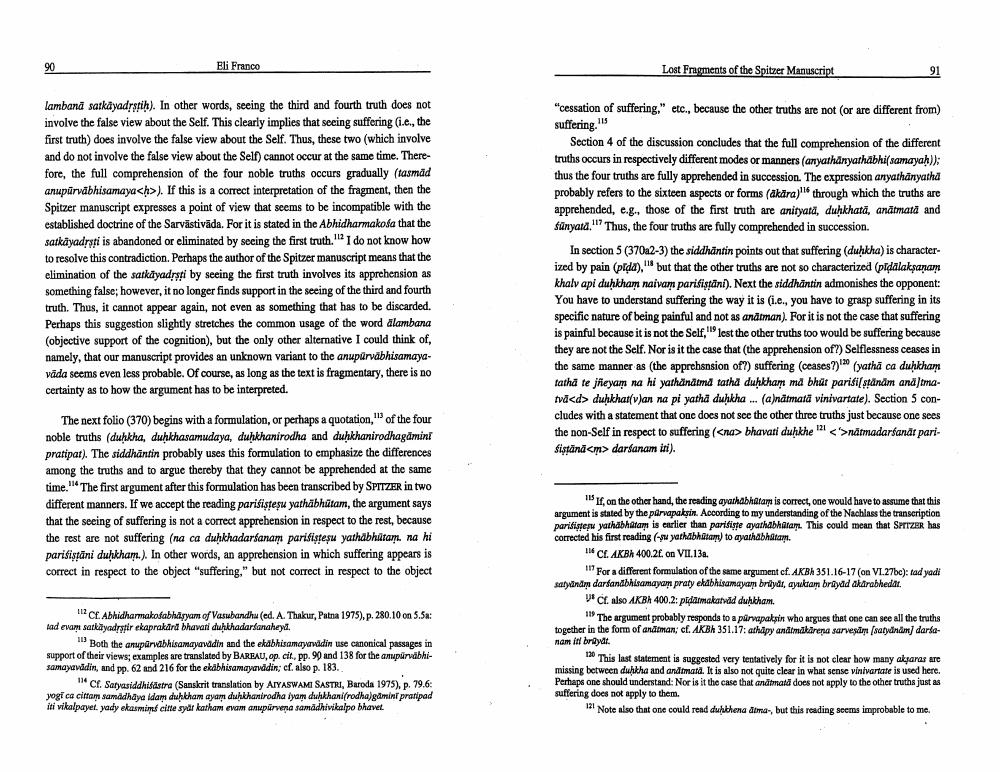Book Title: Lost Fragments Of Spitzer Manuscript Author(s): Eli Franco Publisher: Eli Franco View full book textPage 8
________________ Eli Franco Lost Fragments of the Spitzer Manuscript 91 lamband satkāyadrstih). In other words, seeing the third and fourth truth does not involve the false view about the Self. This clearly implies that seeing suffering (ie, the first truth) does involve the false view about the Self. Thus, these two (which involve and do not involve the false view about the Self) cannot occur at the same time. Therefore, the full comprehension of the four noble truths occurs gradually (tasmdd anupūrvabhisamaya<h>). If this is a correct interpretation of the fragment, then the Spitzer manuscript expresses a point of view that seems to be incompatible with the established doctrine of the Sarvāstivāda. For it is stated in the Abhidharmakośa that the satkāyadrsti is abandoned or eliminated by seeing the first truth." I do not know how to resolve this contradiction. Perhaps the author of the Spitzer manuscript means that the elimination of the satkāyadrsti by seeing the first truth involves its apprehension as something false; however, it no longer finds support in the seeing of the third and fourth truth. Thus, it cannot appear again, not even as something that has to be discarded. Perhaps this suggestion slightly stretches the common usage of the word alambana (objective support of the cognition), but the only other alternative I could think of, namely, that our manuscript provides an unknown variant to the anupurvabhisamayavada seems even less probable. Of course, as long as the text is fragmentary, there is no certainty as to how the argument has to be interpreted. "cessation of suffering," etc., because the other truths are not (or are different from) suffering." Section 4 of the discussion concludes that the full comprehension of the different truths occurs in respectively different modes or manners (anyathanyathabhisamayah)); thus the four truths are fully apprehended in succession. The expression anyathanyatha probably refers to the sixteen aspects or forms (akāra) through which the truths are apprehended, e.g., those of the first truth are anityatá, duhkhatā, anātmatā and Sanyatd." Thus, the four truths are fully comprehended in succession. In section 5 (370a2-3) the siddhāntin points out that suffering (duhkha) is character ized by pain (plda), but that the other truths are not so characterized (pidalaksanam khalv api duhkharri naivam parisistäni). Next the siddhantin admonishes the opponent: You have to understand suffering the way it is (i.e., you have to grasp suffering in its specific nature of being painful and not as anātman). For it is not the case that suffering is painful because it is not the Self,"lest the other truths too would be suffering because they are not the Self. Nor is it the case that the apprehension of?) Selflessness ceases in the same manner as the apprehension of suffering (ceases?) (yatha ca duhkham fatha te jeyam na hiyathåndtmd tatha duhkham md bhūt parisilstandm and)tmatvà<d> duhkhat(v)an na pi yatha duhkha ... (a)nätmatā vinivartate). Section 5 concludes with a statement that one does not see the other three truths just because one sees the non-Self in respect to suffering (<na> bhavati duhkhel <>nätmadarsandt parifistānā<m> darsanam iti). The next folio (370) begins with a formulation, or perhaps a quotation of the four noble truths (duhkha, duhkhasamudaya, duhkhanirodha and duhkhanirodhagamint pratipat). The siddhantin probably uses this formulation to emphasize the differences among the truths and to argue thereby that they cannot be apprehended at the same time. The first argument after this formulation has been transcribed by SPITZER in two different manners. If we accept the reading parisisteșu yathābhūtam, the argument says that the seeing of suffering is not a correct apprehension in respect to the rest, because the rest are not suffering (na ca duhkhadarśanam parisisteșu yathabhitar. na hi parisistäni duhkham.). In other words, an apprehension in which suffering appears is correct in respect to the object "suffering," but not correct in respect to the object 11 If on the other hand, the reading ayathabhatam is correct, one would have to assume that this argument is stated by the purvapaksin. According to my understanding of the Nachlass the transcription parisistes yathabhatam is earlier than parisiste ayathabharam. This could mean that SPITZER has corrected his first reading (-su yathabhūtam) to ayathabhatam. 114 CE. AKBA 400.28. on VII.13a. 11 For a different formulation of the same argument cf. AKBh 351.16-17 (on VI.27be): tad yadi satyandm darsandhisamayan praty ekabhisamayam brilydt, ayuktam brayad akarabhedat. DE CE also AKBH 400.2: pidatmakarydd duḥkham. 119 The argument probably responds to a pūrapaksin who argues that one can see all the truths together in the form of andman, E. AKBH 351.17: athapy and makiarena sarvesdm satydnim dardanam in brayat. 120 This last statement is suggested very tentatively for it is not clear how many akaras are missing between dukha and andmata. It is also not quite clear in what sense vinivartate is used here. Perhaps one should understand: Nor is it the case that anatmata does not apply to the other truths just as suffering does not apply to them. 171 Note also that one could rend duhithena atma-, but this reading seems improbable to me. 112 CE Abhidharmakofabhasyam of Vasubandhu (ed. A. Thakur, Patna 1975), p. 280.10 on 5.5a: Aad evam sarkayadrstir ekaprakārd bhavati dukkhadar Sanay 11 Both the arupurwabhisamayavadin and the ekabhisamayadin use canonical passages in support of their views; examples are translated by BAREAU, op. cit., pp. 90 and 138 for the ampúrvabhisamayavādin, and pp. 62 and 216 for the ekabhisamayavadir; cf. also p. 183. Cf. Satyasiddhifāstra (Sanskrit translation by AIYASWAMI SASTRI, Baroda 1975), p. 79.6: yogi ca cittam samddhaya idam dubham ayam dunkhanirodha ya dukhani(rodha)gamint pratipad iti vikalpayet. yady ekasmimi citte syör katham evam anupūrvena samadhivikalpo bhavet.Page Navigation
1 ... 6 7 8 9 10 11 12 13 14 15 16 17 18
